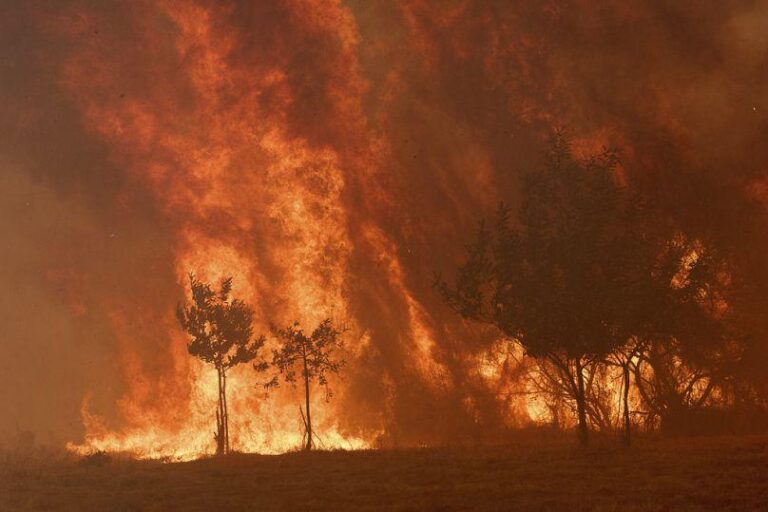Two more people have died as fierce wildfires continue to ravage parts of Spain and Portugal, prompting a large-scale response from emergency services. Spanish troops have been deployed to assist firefighters battling the blazes, which have destroyed thousands of hectares of forest and threatened local communities. Authorities warn that high temperatures and dry conditions are fueling the spread of the fires, complicating containment efforts as residents face evacuations and extensive damage.
Spain and Portugal Grapple with Expanding Wildfires as Death Toll Rises
Intense wildfires continue to ravage regions across Spain and Portugal, prompting large-scale emergency responses as the death toll climbs. In Spain, firefighting teams, with reinforcements from military units, are engaged in a fierce battle against rapidly spreading flames driven by high temperatures and strong winds. Authorities have reported two additional fatalities, bringing grief to communities already strained by previous losses. Evacuations remain underway, as thousands of residents seek safety from the encroaching fires threatening homes, farmland, and protected natural areas.
The situation is further complicated by stretched resources and extreme drought conditions, which have provided tinder-dry vegetation fueling the blazes. Collaborative efforts between Spanish and Portuguese agencies focus on containment strategies and humanitarian aid to those displaced. Below is a summary of key statistics highlighting the scale of the crisis:
- Active fires: Over 30 significant wildfires reported in both countries
- Evacuees: Approximately 10,000 people relocated
- Military deployment: 1,200 Spanish troops assisting firefighting efforts
- Affected hectares: Nearly 150,000 hectares scorched
| Country | Fatalities | Hectares Burned | Firefighter Units Deployed |
|---|---|---|---|
| Spain | 12 | 90,000 | 2,500 |
| Portugal | 7 | 60,000 | 1,800 |
Spanish Troops Deployed to Strengthen Firefighting Efforts Amid Extreme Conditions
In response to the devastating wildfires tearing through regions in Spain and Portugal, the Spanish government has mobilized hundreds of troops to bolster ongoing firefighting operations. These forces are working alongside local firefighters under increasingly perilous conditions fueled by soaring temperatures and strong winds. Their efforts focus on containment, evacuation assistance, and support logistics to prevent further loss of life and property.
Authorities have emphasized the critical role of coordination in these operations, highlighting several key measures implemented on the ground:
- Deployment of specialized units: including forest fire combat teams equipped with advanced firefighting tools.
- Aerial reconnaissance and water-dropping missions: to monitor fire spread and directly suppress flames inaccessible by land.
- Community evacuation plans: aimed at prioritizing vulnerable populations in affected zones.
| Deployment Area | Troops Involved | Equipment Used |
|---|---|---|
| Galicia | 150 | Water cannons, bulldozers |
| Extremadura | 120 | Helicopters, chain saws |
| Castilla y LeĂłn | 100 | Fire retardants, portable pumps |
Urgent Measures Recommended to Enhance Cross-Border Coordination and Prevent Future Disasters
The recent tragedy unfolding in Spain and Portugal highlights an urgent need for enhanced cross-border synergy in wildfire response strategies. Coordinated efforts that transcend national boundaries are vital for timely resource allocation, unified communication channels, and shared intelligence. A critical evaluation of current protocols reveals gaps in rapid information exchange and joint operational command, which, if addressed, could drastically improve firefighting efficiency and minimize casualties.
Key recommendations to strengthen cross-border firefighting mechanisms include:
- Establishing a bi-national emergency operations center to oversee joint tactical responses.
- Standardizing communication equipment and protocols for seamless inter-agency connectivity.
- Implementing shared real-time satellite monitoring systems for early fire detection.
- Conducting regular joint training simulations to develop interoperable teams.
- Creating flexible cross-border legal frameworks to facilitate resource sharing without bureaucratic delays.
| Aspect | Current Status | Recommended Action |
|---|---|---|
| Communication | Fragmented, multiple channels | Unified radio and digital platforms |
| Command Structure | Separate national commands | Joint operations center |
| Training | Occasional, national level only | |
| Training | Occasional, national level only | Regular joint cross-border simulations |
| Legal Framework | Rigid, national restrictions | Flexible cross-border agreements |
| Fire Detection | Limited, delayed reporting | Shared real-time satellite monitoring |
In Summary
As the devastating wildfires continue to ravage parts of Spain and Portugal, the loss of two more lives underscores the severity of this ongoing crisis. Spanish troops remain on the front lines, working tirelessly alongside emergency services to contain the blazes amid challenging conditions. Authorities have urged residents to stay alert and follow safety instructions as firefighting efforts persist. The situation remains fluid, with officials closely monitoring weather patterns that could influence the fires’ behavior in the coming days.



